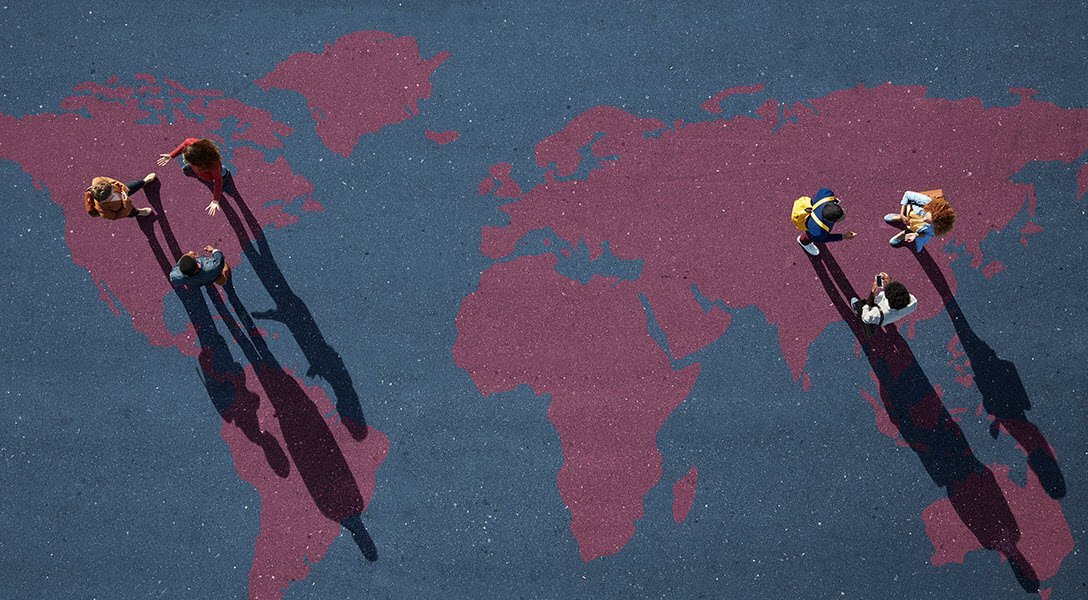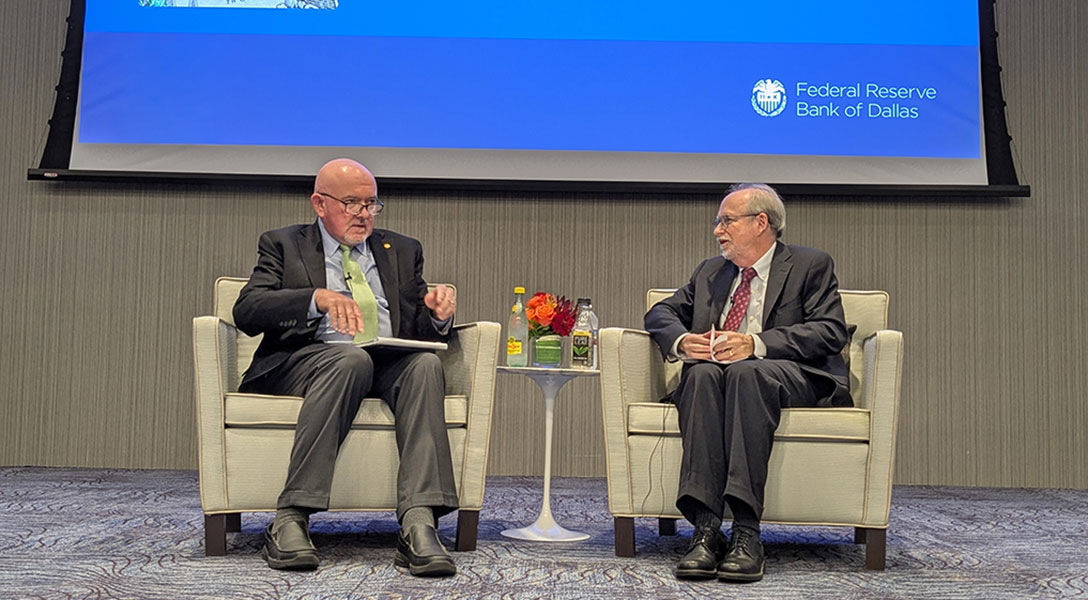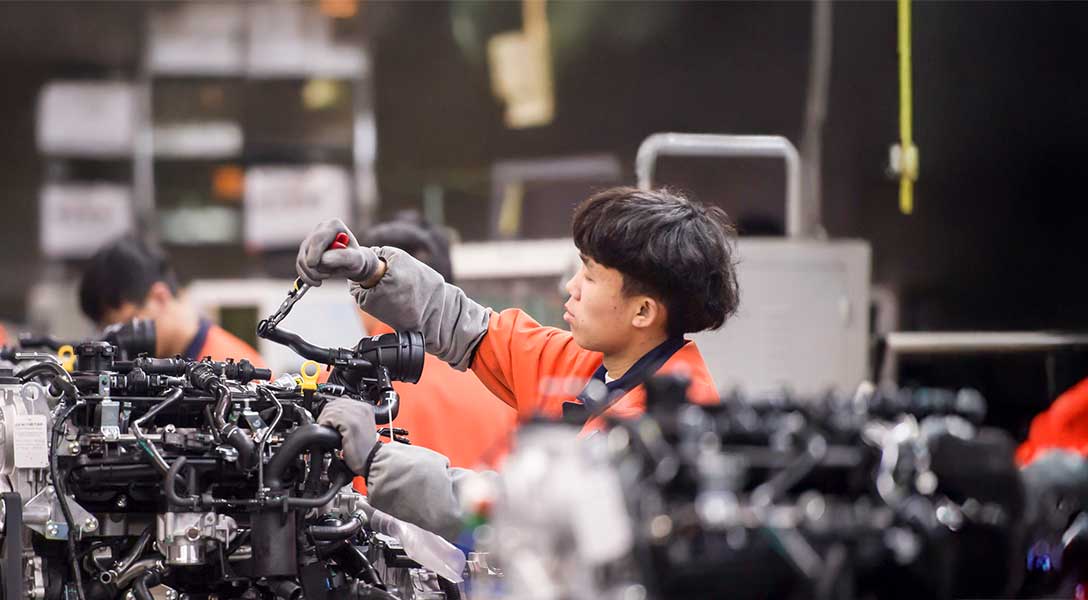
Globalization remains a force despite pandemic, political strains
Q. What is globalization?
Globalization is a very broad term that means many things in many fields. In economics, it means that some markets that cleared at the national level are now clearing at the global level. If it’s goods or services markets, then that would be trade integration, the flow of goods and services across countries.
We can also think of globalization as the integration of labor markets. The increase of migration flows is a manifestation of globalization. Or, you can think of integration in capital markets, which are more global because firms and individuals are investing further away from their local markets.
We have learned in the past few years that globalization is not a linear process. We may have some phases where globalization is on the rise and other phases where globalization is retreating.
Q. Is the world entering an era of deglobalization?
I think there is a potential for the world to enter a deglobalization phase, but the data as of today show very few signs of deglobalization.
Since the Great Recession, you could see a very mild decline in the ratio of world trade to world GDP, but it is completely explained by China moving up the value chain and industrializing. As China develops, it has transitioned from being the assembly factory of the world where countries send components. China now produces some of those components and does not import them. Because China is a humongous economy and is importing less, the world-trade-to-GDP ratio is lower.
Q. Have we gone through deglobalizing phases in the past?
I don’t think we are deglobalizing, but if that were the case, this is not the first time. The inter-war period between World War I and World War II was a significant deglobalization period, accompanied by economic depression. There was a lot of animosity that generated nationalistic policies that reduced integration.
Q. Are reshoring and near-shoring picking up momentum?
I see very little evidence of reshoring or near-shoring. I am not saying it’s not happening; some firms have reported closing down offshore operations and obviously, some firms are moving around, but we have not seen this happen at a scale large enough to show up in aggregate statistics.
The implications of shutting down foreign operations and opening them in the U.S. depend on what motivates those decisions. If China continues industrializing and wages increase to the point that U.S. companies decide to reshore because the cost of labor in China is too high, this may generate new jobs in the U.S., and the process may be less disruptive.
However, it is very different if deglobalization is the result of the aggravation of geopolitical forces. In that case, firms may leave China because they worry they can no longer operate there. This scenario would lead to smaller increases in jobs in the U.S. because these firms will see their global value chains disrupted by geopolitical tensions, and they are not necessarily going to do better in this so-called deglobalizing phase.
In both scenarios, we would tend to have consumers pay higher prices as the price of imports from China will go up.
I believe that as of today and for the next 20 years, technology will remain a factor that will foster globalization. Technological change has tended to benefit interactions at a long distance.
Q. Is technology spurring or slowing globalization?
I believe that as of today and for the next 20 years, technology will remain a factor that will foster globalization. If deglobalization occurs, it will not be driven by technology. Technological change has tended to benefit interactions at a long distance.
There are many technologies in the last few decades that have tended to spur globalization. Think about the ICT [Information and Communications Technology] revolution, or shipping containers or blockchain, for example. These are technologies that likely reduce transaction costs and facilitate suppliers at a long distance, which fosters globalization.
You may say, “Sure but what about automation, industrial robots and 3D printing?” Robots tend to substitute for labor, so if I can produce something with robots, why should I hire foreign labor? But we are far away from a world where robots can take care of all manufacturing.
The bulk of robots are used for assembly. Robots may be very good at putting a car together, but they may not be good at manufacturing a car engine or all other components that go into the assembly process like the electronic components and brake systems. Given that all those components are produced worldwide, we are still going to need trade.
The way I think of automation is as an increase in productivity that allows firms to assemble products much more efficiently. It increases the optimal scale of operation, which increases the demand for components. So conceptually, automation may well increase the extent to which firms rely on foreign components for production. Empirically, every study I have seen points to the complementarity between automation and imports; firms that automate appear to increase their imports.
Q. Supply chains faltered in the pandemic. Will companies hold larger inventories in the future?
I think firms will take a close look at what happened and make sure they are better prepared for shocks going forward. Playing around with inventory is a relatively easy thing to do, and this is not new. There is work showing that as the U.S. has increased trade with China, firms in the U.S. have held more inventory.
There is a lot of talk about firms taking a more drastic approach following COVID, not relying on a single supplier, for example, and increasing diversification of their supplier base. That sounds appealing, but I don’t think that will be doable for many companies. There is good reason why firms rely on a single supplier. It takes a lot of resources for suppliers to customize inputs for their buyers. Spreading that production among many potential suppliers will lead to increased fixed costs and would not be economically efficient.
Q. How has globalization affected inequality across countries and within countries?
The increase in globalization in the ’80s, ’90s and 2000s went hand in hand with increases in inequality in the countries that were liberalizing. That does not mean that world inequality went up. Globalization lifted millions of individuals out of poverty. Globalization generated faster growth in low-income economies, so even though inequality was growing in those countries, the faster growth contributed to an overall global decrease in inequality.
There is a lot of debate about exactly why inequality grew within countries. One reason is that individuals and firms that are more likely to benefit from globalization are relatively skilled individuals or highly productive firms, so that globalization has benefited people who even before globalization were already better off. There is evidence that this has been partly driven by trade but also by technology.
The technological development that fostered globalization had an additional direct impact on inequality. The ICT revolution, for example, was very important for the growth of global value chains but also affected workers who did not have the right skills. People with computer skills became more valuable, increasing wage inequality and the skill premium.
Q. If trade is a net positive but still creates winners and losers, how can we compensate the losers?
It is not entirely clear to me. I am convinced economists should spend more time thinking about distributional effects and contributing to the design of policies that alleviate the negative impacts of globalization.
Does it make sense to differentiate a worker who loses his job due to import competition from China from a worker in Louisiana who loses his job because a company in Tennessee found a better way of doing business? We have to have some kind of unemployment protection but need better ways to weather these shocks.
Folks that face a negative shock tend to be pushed down [in] the income distribution and pay lower taxes. It is puzzling to me that in the past 30 years, despite the increase in inequality due to technological change and globalization, tax progressivity in the U.S. has fallen quite dramatically.
We should have active labor market policies, which are not about writing checks to people when they lose their jobs but rather are about retraining displaced workers. I am talking about well-run employment offices with high-skilled individuals who match displaced workers with job opportunities.
Southwest Economy is published quarterly by the Federal Reserve Bank of Dallas. The views expressed are those of the authors and should not be attributed to the Federal Reserve Bank of Dallas or the Federal Reserve System.
Articles may be reprinted on the condition that the source is credited to the Federal Reserve Bank of Dallas.
Full publication is available online: www.dallasfed.org/research/swe/2022/swe2203.




